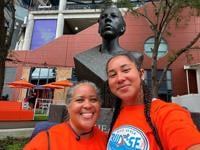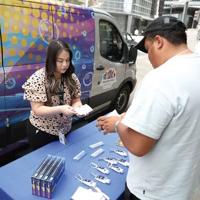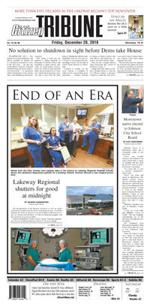WASHINGTON (AP) 69øóó˜°Ïøóæ¼Ç¨û§ A series of bomb threats across multiple battleground states and baseless claims of wrongdoing by former President Donald Trump disrupted an otherwise smooth Election Day that capped a tumultuous presidential campaign.
The bomb threats in parts of Arizona, Georgia and Pennsylvania on Tuesday turned out to be hoaxes, but they forced some polling places to evacuate and extend hours, and delayed the counting of some ballots.
The threats were reported throughout the day at polling locations in three metro Atlanta counties, all with large numbers of Democratic voters, and into the evening at Pennsylvania polling places and election offices where ballots were being counted. Bomb threats also were reported at several voting locations in two Arizona counties, according to the secretary of state's office.
Pennsylvania Gov. Josh Shapiro said in an evening news conference that the hoaxes posed no danger to the public 69øóó˜°Ïøóæ¼Ç¨û§ or to the election. "Every legal, eligible vote will be counted and counted accurately, and the will of the people in the commonwealth of Pennsylvania will be respected," said Shapiro, a Democrat.
Neither Shapiro nor Pennsylvania State Police gave details about who might be behind the hoaxes.
In Georgia's Fulton County, which includes Atlanta, 32 of 177 polling places received bomb threats and five were briefly evacuated. The polling locations were able to reopen after the threats.
"That just shows you the resilience of our system and our people. We're battle-tested," said Georgia Secretary of State Brad Raffensperger, a Republican.
The FBI said many hoax bomb threats in several states appeared to originate from Russian email domains.
The dramatic and troubling end to Election Day came after a highly successful early voting period, when at least half of all votes expected in the presidential election had been cast. By Tuesday, more than 84 million Americans had already voted.
Overall, the final day of voting was characterized by the same kind of routine hiccups and frustrations seen in other elections: a polling worker forgetting to bring a key; ballot printing mistakes; ballot counting machines not working.
The vast majority of problems were "largely expected, routine and planned-for events," said Cait Conley, senior adviser to the director of the U.S. Cybersecurity and Infrastructure Security Agency.
Turnout on Tuesday was robust in many states. In Nevada, one of two western presidential battlegrounds, long lines were reported in Reno and Las Vegas. After polls closed, there was still a three-hour wait at a polling location at the University of Nevada, Reno, according to local election officials.
Despite no evidence of widespread voting problems, Trump made unsubstantiated claims related to Philadelphia and Detroit, and raised questions about election operations in Milwaukee, the biggest cities in three states crucial for deciding the presidency.
Local officials quickly knocked down the claims Trump made on his social media platform, saying there were no indications of any problems that would affect accurately tallying the vote.
The absence of any significant problems had not stopped Trump, the Republican nominee, or the Republican National Committee, from making numerous claims of fraud or election interference during the early voting period, a possible prelude to challenges after Election Day.
In Georgia, a federal judge rejected as "frivolous" a last-minute effort by Republicans to challenge Atlanta-area election offices' collection of mail ballots last weekend 69øóó˜°Ïøóæ¼Ç¨û§ after early voting had ended. U.S. District Judge R. Stan Baker, a Trump appointee, said the GOP argument "does not withstand even the most basic level of statutory review and reading comprehension."
Trump on Tuesday suggested he wouldn't challenge the results of the election 69øóó˜°Ïøóæ¼Ç¨û§ as long as it's fair.
"If it's a fair election, I'd be the first one to acknowledge" the results, Trump said, though what meets that definition wasn't clear.
Trump's Democratic opponent, Vice President Kamala Harris, had urged voters not to fall for Trump's tactic of casting doubt on elections.
The former president began making unsubstantiated claims about voting, ballot counting and law enforcement as Election Day voting neared its end.
He said on his social media platform that there was "talk about massive cheating in Philadelphia" and said law enforcement was on the way. He did not provide details, and there was no immediate indication of what he was referring to. His spokespeople did not respond to requests for comment about what he meant.
Philadelphia District Attorney Larry Krasner issued a statement rejecting Trump's claims as baseless.
"There is no factual basis whatsoever within law enforcement to support this wild allegation," Krasner said. "If Donald J. Trump has any facts to support his wild allegations, we want them now."
Federal election security officials and Shapiro also said they had seen nothing to support Trump's claims. Officer Miguel Torres of the Philadelphia Police Department said he was unaware of any special law enforcement mobilization or "any kind of incident" that would require it.
One of three Philadelphia election board members, Seth Bluestein, a Republican, said on social media that Trump's comment "is yet another example of disinformation." During an evening news conference, he emphasized the security of the city's vote: "There is no evidence whatsoever of massive cheating," he said.
Police in Detroit were equally puzzled by another Trump post that said, "Philadelphia and Detroit! Heavy Law Enforcement is there!" Detroit police said there were no reported issues inside or outside of Huntington Place, the massive convention room where election workers counted ballots.
Evening traffic outside the center was light with no protesters in sight. Barricades were up outside the room and escalators to and from the area were shut off. Police also reported no major problems in the city's more than 400 voting precincts.
"The former president said there was a strong law enforcement presence in Philadelphia and Detroit. That was not true," Michigan Secretary of State Jocelyn Benson said during an evening news conference.
In Milwaukee, election officials said they were recounting more than 30,000 mail ballots "out of an abundance of caution" after it was discovered that doors on the back of ballot scanners were not properly sealed. The effort, which drew the attention of Trump and the RNC, was expected to delay the count there.
Republican Sen. Ron Johnson went to the Milwaukee central count location with the chairman of the Wisconsin Republican Party to observe the effort. Less than two months before Election Day, the Milwaukee election office had drawn praise from Republicans who oversee elections in the state and who had expressed confidence that it was ready.
Arizona, a hotly contested swing state, saw multiple Election Day challenges. Bomb threats targeted polling locations in Cochise and Navajo counties, delaying some results, and frustrated Native American voters stood in hours-long lines in Apache County. A judge ordered some polling places there to remain open two extra hours because of malfunctioning equipment and a lack of printed ballots.
Throughout the day, members of the Navajo Nation reported being turned away by poll workers after waiting for hours. Over 43,000 registered voters live on the Apache County portion of the Navajo Nation, according to court documents in the lawsuit seeking the extension of voting.
Zane James said he waited out in the cold with about 50 other voters for about 2 1/2 hours before they could cast their ballots because of a problem with the site's single printer.
"It was just a mess, it was terrible," he said.
At a polling site in Chinle, on the Navajo Nation, Amanda Woody said she didn't know how long it would take before she would be able to cast her ballot.
"There is a line, but I'm willing to wait," she said. "Every vote counts."
___
The Associated Press receives support from several private foundations to enhance its explanatory coverage of elections and democracy. See more about AP's democracy initiative here. The AP is solely responsible for all content.
















































































































































Commented
Sorry, there are no recent results for popular commented articles.